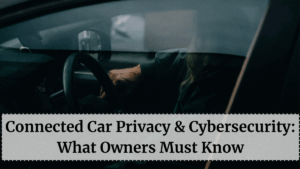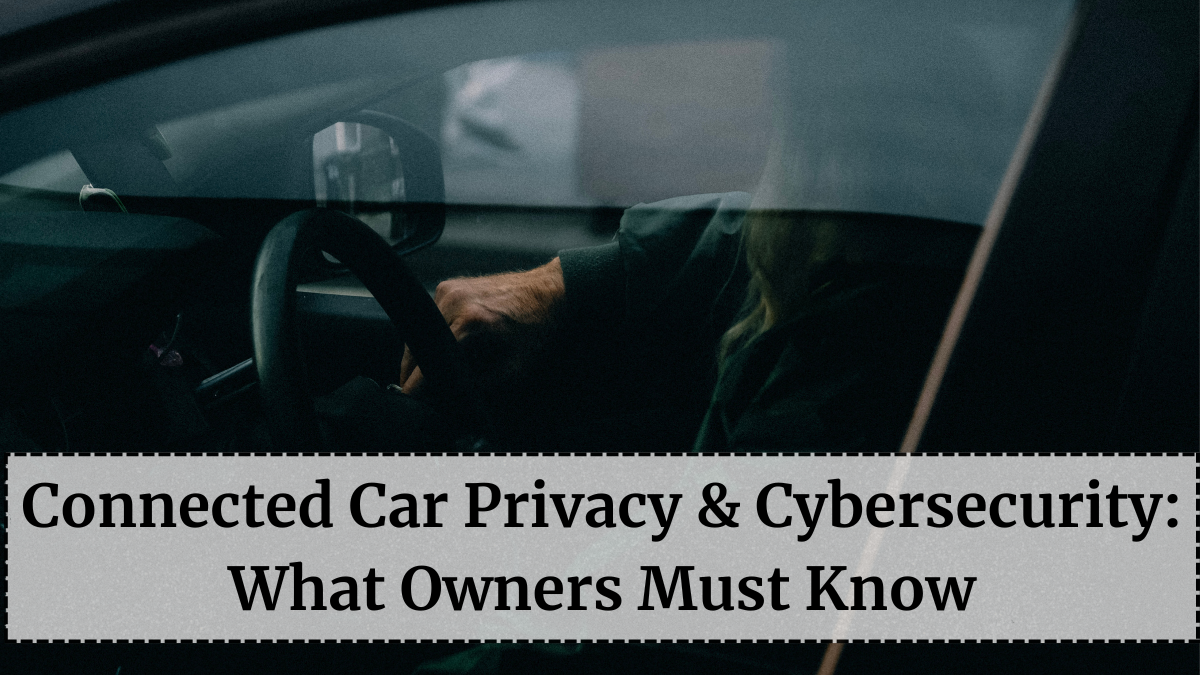Cars today are no longer isolated machines — they’re connected computers on wheels. With Wi-Fi, Bluetooth, GPS, and cloud connectivity, modern vehicles continuously exchange data with apps, satellites, and smart devices. But while this connectivity improves comfort and convenience, it also introduces a serious risk: cybersecurity threats.
In 2025, as more vehicles go online, understanding connected car security is crucial. Protecting your vehicle’s software, data, and privacy isn’t optional anymore — it’s as important as seat belts and airbags.

What Is a Connected Car?
The Modern Definition
A connected car is a vehicle equipped with internet access and communication systems that allow it to interact with external networks, other vehicles, and smart infrastructure.
These cars can:
-
Sync with smartphones and cloud accounts.
-
Receive over-the-air (OTA) updates.
-
Share location and diagnostic data with service centers.
-
Stream entertainment and enable voice commands.
While these features make driving smarter, they also create multiple digital entry points for hackers.
How Connectivity Creates Vulnerability
Every connected feature — from Wi-Fi hotspots to infotainment apps — communicates via data channels. If any one of these channels is poorly secured, cybercriminals can exploit it to access personal information or even control vehicle functions remotely.
The Growing Threat of Car Hacking
How Hackers Access Vehicles
Cyberattacks on vehicles usually occur through one of these routes:
-
Infotainment systems: Hackers exploit weak Bluetooth or app permissions to inject malicious code.
-
Telematics units: These cloud-connected modules can be targeted to extract data or override software.
-
Mobile apps: Compromised car apps can leak login credentials or allow unauthorized control.
-
OBD-II ports: Physical hacking tools can manipulate car sensors and firmware through diagnostic ports.
In recent years, researchers have demonstrated real-world cases of remote car takeovers, where hackers controlled steering, acceleration, and braking systems — emphasizing the urgency of vehicle cybersecurity.
What Data Is at Risk
A connected car stores vast amounts of personal data, including:
-
Location and navigation history.
-
Contact lists and call logs from connected phones.
-
Payment details for tolls, charging, or subscriptions.
-
Driving behavior patterns used by insurance and apps.
If unprotected, this information can be exploited for identity theft, stalking, or fraud.
Key Components of Connected Car Security
1. Encrypted Communication
Modern vehicles use end-to-end encryption to secure data transferred between the car, apps, and cloud servers. This prevents hackers from intercepting or altering messages during transmission.
2. Secure Over-the-Air (OTA) Updates
While OTA updates enhance car performance, they must be protected by digital authentication systems that verify software source integrity before installation. Unauthorized updates could install malicious code.
3. Network Segmentation
To prevent complete system takeovers, automakers now separate entertainment, communication, and safety networks. This means even if hackers access one system, they can’t reach the vehicle’s critical functions.
4. Two-Factor Authentication (2FA)
Connected car apps increasingly use 2FA or biometric logins to ensure that only verified users can access remote controls like climate settings, vehicle start, or GPS tracking.
5. Secure Telematics Gateways
These are firewalls for cars. They monitor and filter data entering and leaving the vehicle, protecting it from unauthorized remote access.
Tips for Car Owners to Stay Cyber-Safe
Update Regularly
Always install official software updates. Automakers release patches to fix vulnerabilities that hackers might exploit. Delaying updates exposes your car to avoidable risks.
Use Strong App Security
-
Set complex passwords for connected car apps.
-
Avoid using the same credentials for multiple platforms.
-
Enable biometric or 2FA login when available.
Limit Shared Access
Avoid sharing your car app’s login credentials or Bluetooth connections with others. Always remove old users or devices before selling or servicing your vehicle.
Turn Off Connectivity When Not Needed
Disable Wi-Fi hotspots, Bluetooth, and remote access when not in use. This minimizes exposure and potential entry points for cyber intrusions.
Review Permissions
Connected cars often sync data with mobile apps. Review what information your app can access — like location, microphone, and contacts — and revoke permissions not required for operation.
Use Trusted Networks Only
Avoid connecting your vehicle to public Wi-Fi or unverified networks. Hackers can easily set up fake hotspots to intercept your data.
What Automakers Are Doing in 2025
Car manufacturers are taking cybersecurity seriously by:
-
Partnering with cybersecurity firms like McAfee, Blackberry QNX, and Bosch.
-
Implementing intrusion detection systems (IDS) that constantly monitor for suspicious activity.
-
Conducting regular ethical hacking tests to identify weaknesses before criminals do.
-
Training service staff on cybersecurity protocols during repairs and diagnostics.
In 2025, several automakers, including Tesla, Mercedes-Benz, and Tata Motors, have launched Vehicle Cybersecurity Centers that actively track global threats and release real-time security updates.
The Future of Connected Car Privacy
The next step in automotive cybersecurity is AI-driven threat prediction. Artificial Intelligence will soon detect unusual network behavior and block suspicious activity before it impacts the vehicle.
Meanwhile, data privacy regulations are expanding. India’s Digital Personal Data Protection Act (DPDP 2023) and Europe’s GDPR now apply to connected cars, ensuring that driver data is collected and used responsibly.
Ultimately, cybersecurity will become a built-in feature of every car — as essential as brakes or airbags.
FAQs
Can my connected car be hacked remotely?
Yes, it’s possible but rare. Using encrypted networks and keeping your software updated significantly reduces the risk.
What personal data does my car collect?
Connected cars collect data like GPS history, driver habits, app usage, and system diagnostics to improve performance and services.
How can I protect my vehicle from hackers?
Update software regularly, use secure passwords, avoid public Wi-Fi, and disable unused connectivity features.
Do automakers monitor car data?
Yes, but reputable automakers anonymize data for analytics. Always review your car’s privacy policy for transparency.
Is cybersecurity covered under warranty?
Most automakers now include basic cybersecurity support and OTA security patches as part of warranty services.
Click here to know more.
